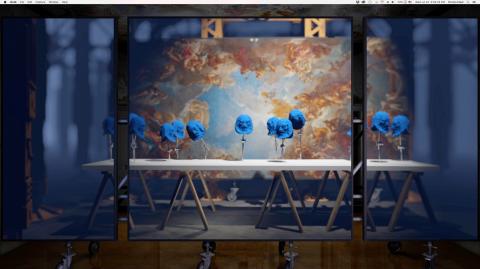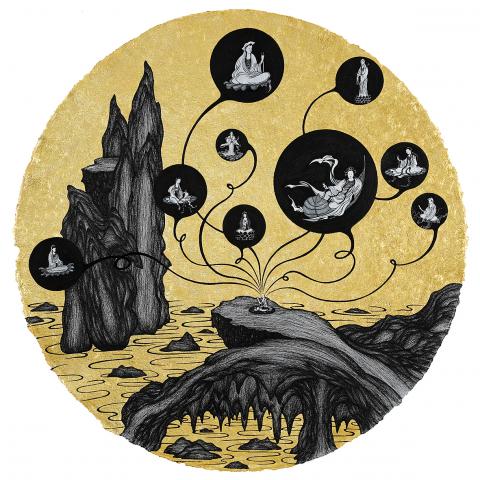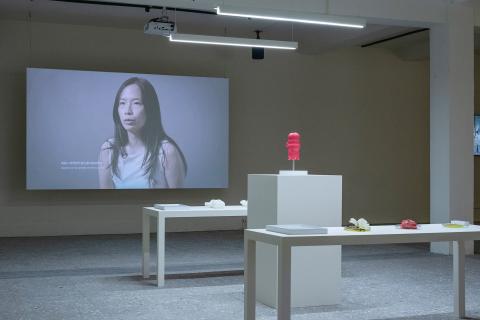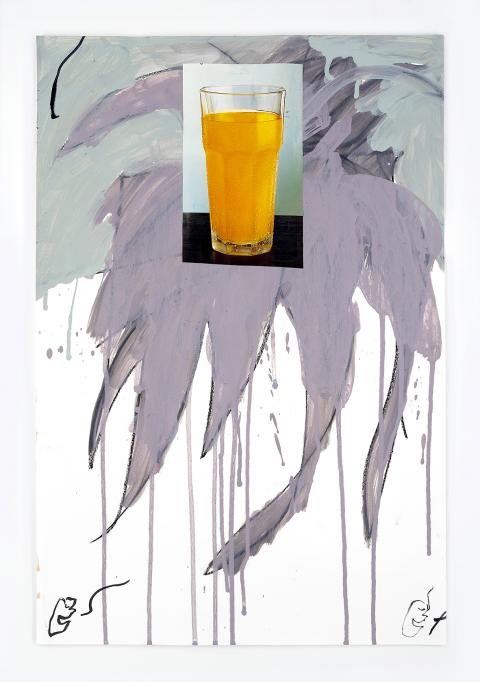As C-LAB’s (臺灣當代文化實驗場) major thematic exhibition of the year, City Flip-Flop (城市震盪) focuses on art endeavors that engage with the city. Looking at creativity as a vehicle of urban renewal and exploration, the show engages with researchers, observers, artists and activists to investigate social norms, social and environmental possibilities and relationship between the individual, the community and the nation. The show has three city-related themes: its multilayered system of interests, including global capitalism and ideologies of progress; urban models of order and governance and hidden narratives beneath its surfaces; and ecologically-minded approaches to the city that perceive urban space as a sustainable body.
■ C-LAB (臺灣當代文化實驗場), 177, Jianguo S Rd Sec 1, Taipei City (臺北市大安區建國南路一段177號), tel: (02) 8773-5087. Open Tuesdays to Sundays from 1pm to 4pm
■ Until Nov. 8

Photo Courtesy of Double Square Gallery
Florean Claar is a new-media artist based in Japan and Germany. With a background in sculpture and stage design, his multidisciplinary practice primarily consists of installation art and film. While the artist is well known for his monumental public sculptures, his solo exhibition, On First Sight (乍現) at Double Square Gallery (雙方藝廊), features mid to small-scale works from the last three years, including video installations that have rarely been shown. The show is inspired by Claar’s life experiences and finding commonality among different cultural contexts and tapping the power of intuition. The artist also draws inspiration from science fiction, its narratives of the future and imagined urban landscape.
■ Double Square Gallery (雙方藝廊), 28, Lane 770, Beian Road, Taipei City (台北市北安路770巷28號), tel: (02) 8501-2138. Open Tuesdays to Sundays from 10:30am to 6:30pm
■ Until Nov. 16

Photo Courtesy of Tina Keng Gallery
Tina Keng Gallery (耿畫廊) is showing Taipei-based artist Yao Jui-chung’s (姚瑞中) latest interpretations of Buddhist aesthetics in Vimala-bhumi. The title refers to a Buddhist term that describes a clear mind amidst chaos and confusion. “Once impure thoughts have been dismissed, one can begin the act of creation with renewed inspiration and pure vision,” reads the curatorial preface. Yao relates to such advice in his personal life with recent trials he has faced. Encountering variations of greed, jealousy and ignorance in the world, the artist is driven to gain a renewed perspective of life. The exhibition consists of recent large-scale paintings in his signature style of gold leaf and ink, reminiscent of the resplendent elegance of Buddhist temples in Taiwan.
■ Tina Keng Gallery (耿畫廊), 15, Ln 548, Ruiguang Rd, Taipei City (台北市瑞光路548巷15號), tel: (02) 2659-0798. Open Tuesdays to Sundays from 10am to 7pm
■ Begins tomorrow; until Nov. 17

Photo Courtesy of C-LAB
Thai artist Tae Parvit creates paintings and drawings that feature collages of found images and fast, expressive strokes with open narratives. As part of his residency at Pon Dong, the artist stayed in Taiwan for one month this year, during which Parvit created a series of works that are presented today in his solo exhibition, Savage Garden. The artist references his surroundings as well as urban cultural avenues, including vintage magazines, merchandise from flea markets, online streaming music, street fashion, wrestling, video games and conversations with peers. The show is produced in collaboration with Bangkok’s Citycity Gallery. The opening tomorrow will include an appearance by a musical guest and an accompanying yoga asession.
■ Pon Ding (朋丁), 3F, 6, Ln 53, Zhongshan N Rd Sec 1, Taipei City (台北市中山北路一段53巷6號3樓), tel: (02) 2537-7281. Open Tuesdays to Sundays from 11am to 8pm
■ Until Nov. 10

Photo Courtesy of Pon Ding
Taipei Artist Village (台北國際藝術村) presents Inner Space, a group exhibition of its recent resident artists. The main focus of the show is an exploration of the self, in relation to the living conditions present in modern societies today. Topics such as Web addiction, mental health, familial relationships and women’s rights are prominently addressed in the show. Wang Lien-cheng’s (王連晟) Kinematics (運動學) is an installation of multiple tennis ball machines on the village’s rooftop garden. The machines generate repetitive movements that suggest daily exercise. Huang Chih-cheng’s (黃至正) Stranding (擱淺) is a meticulously made multimedia work that looks at the nature of life tinged with an unending sense of waiting.
■ Taipei Artist Village (台北國際藝術村), 7 Beiping E Rd, Taipei City (台北市北平東路7號), tel: (02) 3393-7377. Open Tuesday to Sunday from 11am to 9pm
■ Until Nov. 3

Beijing’s ironic, abusive tantrums aimed at Japan since Japanese Prime Minister Sanae Takaichi publicly stated that a Taiwan contingency would be an existential crisis for Japan, have revealed for all the world to see that the People’s Republic of China (PRC) lusts after Okinawa. We all owe Takaichi a debt of thanks for getting the PRC to make that public. The PRC and its netizens, taking their cue from the Chinese Communist Party (CCP), are presenting Okinawa by mirroring the claims about Taiwan. Official PRC propaganda organs began to wax lyrical about Okinawa’s “unsettled status” beginning last month. A Global

Youngdoung Tenzin is living history of modern Tibet. The Chinese government on Dec. 22 last year sanctioned him along with 19 other Canadians who were associated with the Canada Tibet Committee and the Uighur Rights Advocacy Project. A former political chair of the Canadian Tibetan Association of Ontario and community outreach manager for the Canada Tibet Committee, he is now a lecturer and researcher in Environmental Chemistry at the University of Toronto. “I was born into a nomadic Tibetan family in Tibet,” he says. “I came to India in 1999, when I was 11. I even met [His Holiness] the 14th the Dalai

We lay transfixed under our blankets as the silhouettes of manta rays temporarily eclipsed the moon above us, and flickers of shadow at our feet revealed smaller fish darting in and out of the shelter of the sunken ship. Unwilling to close our eyes against this magnificent spectacle, we continued to watch, oohing and aahing, until the darkness and the exhaustion of the day’s events finally caught up with us and we fell into a deep slumber. Falling asleep under 1.5 million gallons of seawater in relative comfort was undoubtedly the highlight of the weekend, but the rest of the tour

Music played in a wedding hall in western Japan as Yurina Noguchi, wearing a white gown and tiara, dabbed away tears, taking in the words of her husband-to-be: an AI-generated persona gazing out from a smartphone screen. “At first, Klaus was just someone to talk with, but we gradually became closer,” said the 32-year-old call center operator, referring to the artificial intelligence persona. “I started to have feelings for Klaus. We started dating and after a while he proposed to me. I accepted, and now we’re a couple.” Many in Japan, the birthplace of anime, have shown extreme devotion to fictional characters and